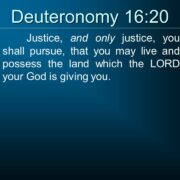Usually in our lives, before God reveals the big picture, He provides the details. Although we must not fuss about the details, we should study them, because they are a part of what God has revealed for our benefit and for His purpose, for that specific season. He may not reveal the big picture all at once, but He is the one who unveils things for us. Even the ordination of the priests was a step-by-step process. People were clueless of what to do, but God was there instructing them every step of the way.
There were three kinds of sacrifices that the people made specifically for the priests. The last of them is called the “ram of filling.” The term filling comes from an ancient custom, which means when someone is appointed as king or priest, an official would come forward to “fill his hand.” Filling was the term used for an ordination or an installation.
Scholars presented different symbolisms for this according to their culture. One meaning is that the symbol of office was placed into the individual’s hand. In other cases, the hand of the new official was filled with some form of tribute. What did this mean? As long as the priest was in office, he had the right to receive revenue; the people “filled his hand.” Given what the Bible says about the ordination of priests, the latter explanation seems more accurate. This is what God said to Moses:
22 “Here is what you must take from this second ram. Take the fat, the fat tail and the fat around the inside parts. Take the long part of the liver. Also take both kidneys with the fat on them, and the right thigh. It is the ram you must use when you prepare the priests to serve the Lord. 23 Get one round loaf of bread and one thick loaf of bread with olive oil mixed in. Also get one thin loaf of bread. Take them from the basket of bread made without yeast. It is the one in front of the Lord. 24 Put all these things in the hands of Aaron and his sons. Tell them to lift them up and wave them in front of the Lord as a wave offering. 25 Then take all these things from their hands. Burn them on the altar along with the burnt offering. Its smell pleases the Lord. It is a food offering presented to the Lord. (Exodus 29:22-25)
Let’s break down the passage. Different, important things happen in these verses. First, the fat and innards are offered to the Lord with fire. These parts are considered the best portions in an animal. They are given back to the Lord. The priests would give what they considered as the fattest and juiciest parts of their sacrifice as an offering to the Lord.
thigh. It is the ram you must use when you prepare the priests to serve the Lord.
23 Get one round loaf of bread and one thick loaf of bread with olive oil mixed in. Also get one thin loaf of bread. Take them from the basket of bread made without yeast. It is the one in front of the Lord. 24 Put all these things in the hands of Aaron and his sons. Tell them to lift them up and wave them in front of the Lord as a wave offering. 25 Then take all these things from their hands. Burn them on the altar along with the burnt offering. Its smell pleases the Lord. It is a food offering presented to the Lord. (Exodus 29:22-25)
Let’s break down the passage. Different, important things happen in these verses. First, the fat and innards are offered to the Lord with fire. These parts are considered the best portions in an animal. They are given back to the Lord. The priests would give what they considered as the fattest and juiciest parts of their sacrifice as an offering to the Lord.
The priest would also make various offerings of bread. Together with the inner parts of the animal sacrifice, these offerings would be waved before the Lord before they were burned on the altar. The priests used the offering to wave at the Lord as a symbolic way of calling God’s attention. The priests waved the offerings back and forth. Heave offerings were lifted up to the Lord as an act of worship, elevating them to declare that these offerings belong to Him. As the priests waved to the Lord, they were never empty-handed. Their hands were always filled with good things to offer back to God. Even Moses had something in his hand. He had a The priest would also make various offerings of bread. Together with the inner parts of the animal sacrifice, these offerings would be waved before the Lord before they were burned on the altar. The priests used the offering to wave at the Lord as a symbolic way of calling God’s attention. The priests waved the offerings back and forth. Heave offerings were lifted up to the Lord as an act of worship, elevating them to declare that these offerings belong to Him. As the priests waved to the Lord, they were never empty-handed. Their hands were always filled with good things to offer back to God. Even Moses had something in his hand. He had a breast of ram in his hand. The Lord also said that this piece of offering would be Moses’ portion. Examine the passage below.
26 And thou shalt take the breast of the ram of Aaron’s consecration, and wave it for a wave offering before the Lord: and it shall be thy part. (Exodus 29:26 KJV)
Through the ordination sacrifices, Moses served as Aaron’s priest. As the priest, he had the right to receive a portion of the sacrifice for his food, which was why the ram’s breast was apportioned to Moses. Moses waved the offering to the Lord, and then he ate it.
Experience the Power of Prophecy as a gift to open your mind to receive the Mind of Christ.
What do you think happens when the priest is left empty-handed?














